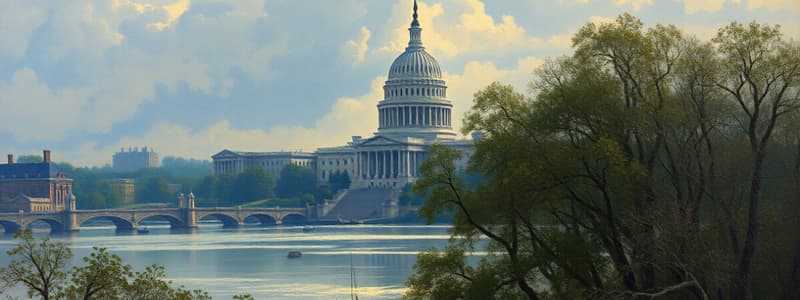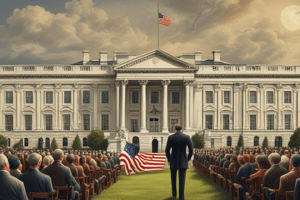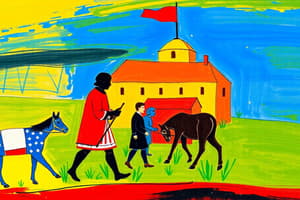Podcast
Questions and Answers
What did strict constructionists believe in?
What did strict constructionists believe in?
- Political parties
- Widespread development for the country
- The Elastic Clause
- Following the constitution exactly (correct)
What is a protective tariff?
What is a protective tariff?
A tax placed on goods from another country to protect the home industry.
What was the Whiskey Rebellion?
What was the Whiskey Rebellion?
A 1794 rebellion by farmers in Pennsylvania against Hamilton's excise tax on whiskey.
What did Washington's Farewell Address warn against?
What did Washington's Farewell Address warn against?
What was the outcome of the Battle of Fallen Timbers?
What was the outcome of the Battle of Fallen Timbers?
What is impressment?
What is impressment?
What occurred during the Chesapeake-Leopard Affair?
What occurred during the Chesapeake-Leopard Affair?
Who was Citizen Genet?
Who was Citizen Genet?
What was Jay's Treaty?
What was Jay's Treaty?
What was the significance of Pinckney's Treaty?
What was the significance of Pinckney's Treaty?
What was the XYZ Affair?
What was the XYZ Affair?
What was the Quasi-War?
What was the Quasi-War?
Who was John Adams?
Who was John Adams?
Who were the Democratic-Republicans?
Who were the Democratic-Republicans?
Executive Order 6088:
Executive Order 6088:
Flashcards
Strict Construction
Strict Construction
Adhering strictly to the Constitution, opposing actions not explicitly stated.
Loose Construction
Loose Construction
Interpreting the Elastic Clause to broaden government powers for national development.
Protective Tariff
Protective Tariff
Tax on imports to protect domestic industries from foreign competition.
Whiskey Rebellion
Whiskey Rebellion
Signup and view all the flashcards
Washington's Farewell
Washington's Farewell
Signup and view all the flashcards
Battle of Fallen Timbers
Battle of Fallen Timbers
Signup and view all the flashcards
Impressment
Impressment
Signup and view all the flashcards
Chesapeake-Leopard Affair
Chesapeake-Leopard Affair
Signup and view all the flashcards
Citizen Genet
Citizen Genet
Signup and view all the flashcards
Jay's Treaty
Jay's Treaty
Signup and view all the flashcards
Pinckney's Treaty
Pinckney's Treaty
Signup and view all the flashcards
XYZ Affair
XYZ Affair
Signup and view all the flashcards
Quasi-War
Quasi-War
Signup and view all the flashcards
John Adams
John Adams
Signup and view all the flashcards
Democratic-Republicans
Democratic-Republicans
Signup and view all the flashcards
Study Notes
Strict/Loose Construction
- Strict constructionists, primarily Democratic-Republicans, insisted on adhering closely to the Constitution, opposing actions not explicitly mentioned in it.
- Loose constructionists, mainly Federalists, interpreted the Elastic Clause to justify a broader scope of government powers to foster national development.
Protective Tariff
- A protective tariff is a tax imposed on imported goods to shield domestic industries from foreign competition.
Whiskey Rebellion
- Occurred in 1794 when Pennsylvania farmers revolted against Hamilton's excise tax on whiskey, leading to violence and federal officer casualties.
- President Washington led the military response, demonstrating the federal government's ability to maintain order, contrasting with the Articles of Confederation's ineffectiveness during Shay's Rebellion.
Washington's Farewell Address
- Advised against entanglement in European affairs and permanent alliances.
- Warned against forming political parties and encouraged unity, discouraging sectional divisions within the nation.
Battle of Fallen Timbers
- U.S. Army victory over Native American forces commanded by Shawnee Chief Blue Jacket.
- Marked the end of Native American resistance to U.S. expansion north of the Ohio River.
Impressment
- The British naval practice of seizing American sailors from ships, forcing them into service, which contributed to tensions leading to the War of 1812.
Chesapeake-Leopard Affair
- In 1807, a British warship attacked the American ship USS Chesapeake off Virginia's coast, killing American crew members and inflaming anti-British sentiments in the U.S.
Citizen Genet
- Edmond Genet’s actions polarized American politics by forming the American Foreign Legion, which aimed to attack Spanish territories in the South.
Jay's Treaty
- A 1794 treaty between the U.S. and Britain aimed at improving trade relations; included Britain's agreement to withdraw from Northwest forts.
Pinckney's Treaty
- An agreement with Spain that revised Florida's borders and facilitated American navigation and trade through the port of New Orleans.
XYZ Affair
- A diplomatic incident in 1797 where French officials, designated "X," "Y," and "Z," demanded bribes from U.S. diplomats, escalating tensions between the two nations.
Quasi-War
- An undeclared naval conflict between the United States and France from 1798 to 1800, sparked by French aggression against American shipping.
John Adams
- Served as America's first Vice-President and second President; a prominent advocate for independence and supporter of press freedoms in Massachusetts.
Democratic-Republicans
- Emerged as the main opposition to the Federalists, led by Thomas Jefferson, advocating for agrarian interests and favoring a weaker central government.
Executive Order 6088
- [Definition not provided; ensure to fill in the details if available.]
Studying That Suits You
Use AI to generate personalized quizzes and flashcards to suit your learning preferences.




